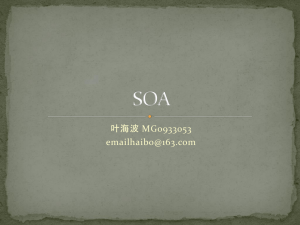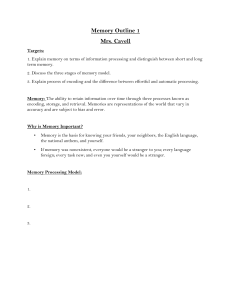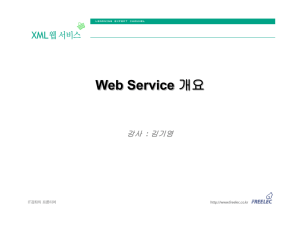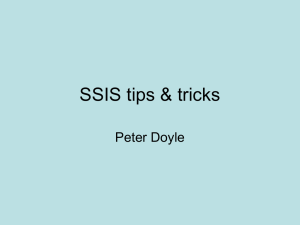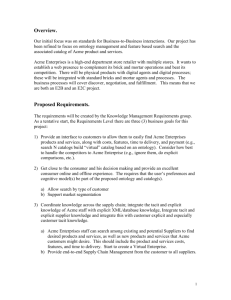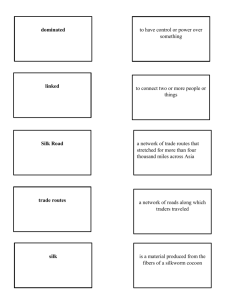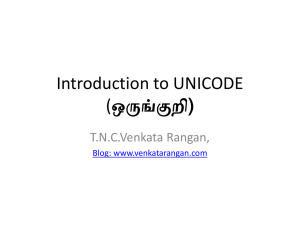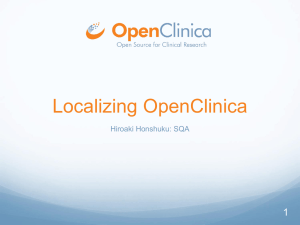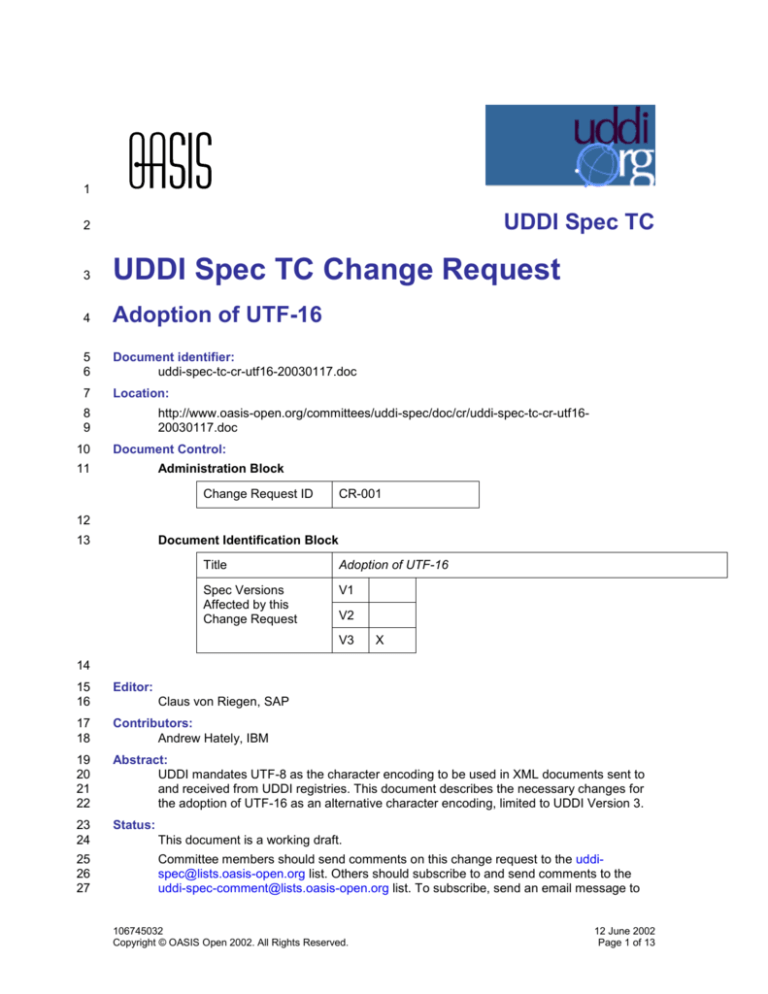
1
UDDI Spec TC
2
3
UDDI Spec TC Change Request
4
Adoption of UTF-16
5
6
Document identifier:
uddi-spec-tc-cr-utf16-20030117.doc
7
Location:
8
9
10
http://www.oasis-open.org/committees/uddi-spec/doc/cr/uddi-spec-tc-cr-utf1620030117.doc
Document Control:
11
Administration Block
Change Request ID
CR-001
12
13
Document Identification Block
Title
Adoption of UTF-16
Spec Versions
Affected by this
Change Request
V1
V2
V3
X
14
15
16
Editor:
17
18
Contributors:
Andrew Hately, IBM
19
20
21
22
Abstract:
UDDI mandates UTF-8 as the character encoding to be used in XML documents sent to
and received from UDDI registries. This document describes the necessary changes for
the adoption of UTF-16 as an alternative character encoding, limited to UDDI Version 3.
23
24
Status:
25
26
27
Claus von Riegen, SAP
This document is a working draft.
Committee members should send comments on this change request to the uddispec@lists.oasis-open.org list. Others should subscribe to and send comments to the
uddi-spec-comment@lists.oasis-open.org list. To subscribe, send an email message to
106745032
Copyright © OASIS Open 2002. All Rights Reserved.
12 June 2002
Page 1 of 13
28
29
uddi-spec-comment-request@lists.oasis-open.org with the word "subscribe" as the body
of the message.
30
106745032
Copyright © OASIS Open 2002. All Rights Reserved.
12 June 2002
Page 2 of 13
31
32
33
34
35
36
37
38
39
40
41
42
43
44
45
46
47
48
49
50
51
Table of Contents
1
Problem Outline ...................................................................................................................... 4
1.1 Terminology........................................................................................................................... 4
2
Solution Outline ....................................................................................................................... 5
3
Impact Statement (optional) .................................................................................................... 6
4
Spec Change Detail ................................................................................................................ 7
4.1 Section 4.2 XML Encoding Requirements ............................................................................ 7
4.2 Section 4.3 Support for Unicode: Byte Order Mark ............................................................... 7
4.3 Section 9.5.16 Node XML Encoding Policy .......................................................................... 8
4.4 Section 9.7.2 UDDI Node Policy Abstractions ...................................................................... 8
4.5 Section 10.2.13 XML Encoding ............................................................................................. 8
4.6 Appendix L Glossary of Terms .............................................................................................. 8
5
Alternatives Considered (optional) .......................................................................................... 9
5.1 No change ............................................................................................................................. 9
5.2 Additional adoption in UDDI Version 2 .................................................................................. 9
6
References ............................................................................................................................ 10
6.1 Normative ............................................................................................................................ 10
6.2 Non-Normative .................................................................................................................... 10
Appendix A. Acknowledgments ..................................................................................................... 11
Appendix B. Revision History ........................................................................................................ 12
Appendix C. Notices ...................................................................................................................... 13
52
106745032
Copyright © OASIS Open 2002. All Rights Reserved.
12 June 2002
Page 3 of 13
53
1 Problem Outline
54
55
56
The XML 1.0 specification itself (see [XML]) states that all XML processors must support UTF-8
and [UTF16]. As a consequence, Web service clients in general are free to choose either UTF-8
or UTF-16 in messages sent to the Web service provider.
57
58
59
All versions of UDDI mandate UTF-8 as the character encoding to be used in XML documents
sent to and received from UDDI registries. This means that UDDI profiles the XML specification
and does not give UDDI clients the option to choose the character encoding.
60
1.1 Terminology
61
62
The key words must, must not, required, shall, shall not, should, should not, recommended, may,
and optional in this document are to be interpreted as described in [RFC2119].
106745032
Copyright © OASIS Open 2002. All Rights Reserved.
12 June 2002
Page 4 of 13
63
2 Solution Outline
64
65
A client of one of the UDDI Version 3 APIs MUST use either UTF-8 or UTF-16 as the character
encoding used in request messages sent to a UDDI node that has implemented the API.
66
67
The UDDI node itself MUST use either UTF-8 or UTF-16 in response messages sent back to the
client.
68
69
70
71
A UDDI node that also supports UDDI Versions 1 and/or 2 APIs MUST use UTF-8 in response
messages sent back to a client that previously sent a request message of a UDDI version 1
and/or 2 API. This is simply implied by the UDDI Version 1 and Version 2 specifications, since
they are not changed to additionally support UTF-16.
72
73
74
A best practice for the encoding of response messages in UDDI Version 3 can be to always use
UTF-8 (for international purposes) or the encoding that is optimized to the languages of a node’s
user community.
106745032
Copyright © OASIS Open 2002. All Rights Reserved.
12 June 2002
Page 5 of 13
75
3 Impact Statement
76
77
There is no impact for a UDDI V1/V2 client using a UDDI node that supports V1/V2 and V3, since
UTF-8 is still the only character encoding used in request and response messages.
78
79
80
A UDDI V3 client MAY use UTF-16 instead of UTF-8 for request messages. A UDDI V3 client
MUST accept UTF-16 for response messages. The easiest way to meet these requirements is to
generally adopt UTF-16, both for request and response messages.
81
82
83
A UDDI V3 node MUST also accept UTF-16 for request messages. A UDDI V3 node MAY use
UTF-16 instead of UTF-8 for response messages. The easiest way to meet these requirements is
to generally adopt UTF-16, both for request and response messages.
106745032
Copyright © OASIS Open 2002. All Rights Reserved.
12 June 2002
Page 6 of 13
84
4 Spec Change Detail
85
4.1 Section 4.2 XML Encoding Requirements
86
This section currently states
87
88
89
90
91
“All messages sent to and received from UDDI nodes MUST be encoded as UTF-8, and MUST
specify the Hyper Text Transport Protocol (HTTP) Content-Type header with a charset parameter
of "utf-8" and a content type of text/xml. All such messages MUST also have the 'encoding="UTF8"' markup in the XML-DECL that appears on the initial line. Other encoding name variants, such
as UTF8, UTF_8, etc. MAY NOT be used. Therefore, to be explicit, the initial line MUST be:
92
93
94
<?xml version="1.0" encoding="UTF-8" ?>
and the Content-Type header MUST be:
Content-type: text/xml; charset="utf-8"
95
All parts of the Content-type header are case insensitive and quotations are optional.
96
UDDI nodes MUST reject messages that do not conform to this requirement.”
97
and should be changed to read
98
99
100
101
102
103
“All messages sent to and received from UDDI nodes MUST be encoded in either UTF-8 or UTF16, and MUST specify the Hyper Text Transport Protocol (HTTP) Content-Type header with a
charset parameter of "utf-8" or “utf-16” respectively and a content type of text/xml. All such
messages MUST also have the corresponding 'encoding="UTF-8"' or 'encoding="UTF-16"'
markup in the XML-DECL that appears on the initial line. Other encoding name variants, such as
UTF8, UTF_8, etc. MAY NOT be used.
104
Therefore, to be explicit, when using UTF-8, the initial line MUST be:
105
106
107
108
109
110
111
<?xml version="1.0" encoding="UTF-8" ?>
and the Content-Type header MUST be:
Content-type: text/xml; charset="utf-8"
When using UTF-16, the initial line MUST be:
<?xml version="1.0" encoding="UTF-16" ?>
and the Content-Type header MUST be:
Content-type: text/xml; charset="utf-16"
112
All parts of the Content-type header are case insensitive and quotations are optional.
113
UDDI nodes MUST reject messages that do not conform to this requirement.
114
For simplification purposes, all examples in this document use UTF-8.”
115
4.2 Section 4.3 Support for Unicode: Byte Order Mark
116
This section currently states
117
118
“UDDI nodes MUST NOT return a Byte Order Mark with any of the response messages defined in
this specification. All such responses MUST be encoded in UTF-8.”
119
and should be changed to read
106745032
Copyright © OASIS Open 2002. All Rights Reserved.
12 June 2002
Page 7 of 13
120
121
122
“UDDI nodes MUST NOT return a Byte Order Mark with any response message that is encoded
in UTF-8. All request and response messages that are encoded in UTF-16 MUST begin with a
Byte Order Mark. UDDI nodes MUST reject messages that do not conform to this requirement.”
123
4.3 Section 9.5.16 Node XML Encoding Policy
124
125
This section should be added in order to specify a node’s policy to choose the character
encoding for response messages.
126
127
128
129
130
131
“A node MAY specify on when it uses UTF-8 or UTF-16 as the character encoding in request1
and response messages. While UDDI implementations do not have to be aware of the request
message’s character encoding in general, the node XML encoding policy may specify in particular
the character encoding it uses in response messages. Reasonable choices are “always UTF-8”,
“always UTF-16”, or “the same character encoding that was used in corresponding request
messages”. The latter may be useful for client-side XML document processing optimization.”
132
4.4 Section 9.7.2 UDDI Node Policy Abstractions
133
A row should be added to the table in this section to list the added policy as follows.
Policy
Group
Policy Name
Policy Rule Description
PDP
Sections
Type
Misc.
Node XML
Encoding
A node MAY specify
the character encoding
(UTF-8 or UTF-16) it
uses in response
messages.
Node
Error! Reference
source not found.
Node XML
Encoding Policy
Document
Error! Reference
source not found.
XML Encoding
Requirements
134
4.5 Section 10.2.13 XML Encoding
135
136
This section should be added in order to specify that a node that supports both UDDI Version 2
and 3 still uses UTF-8 in response messages to a Version 2 API call.
137
138
“Because UTF-16 is not supported in both UDDI Version 1 and 2, all response messages to UDDI
Version 1 or 2 API calls are encoded in UTF-8.”
139
4.6 Appendix L Glossary of Terms
140
This section currently states
141
142
“UTF-16: An encoding scheme used to express Unicode characters. See:
http://www.ietf.org/rfc/rfc2781.txt. Not used by UDDI”
143
and should be changed to read
144
145
“UTF-16: An encoding scheme used to express Unicode characters. See:
http://www.ietf.org/rfc/rfc2781.txt.”
1
Several UDDI APIs include request messages that are to be issued by a UDDI node. For
example, the notify_subscriptionListener API, as specified in Section 5.5.12
notify_subscriptionListener, is implemented by a subscriber and used by the UDDI node to sent
notifications.
106745032
Copyright © OASIS Open 2002. All Rights Reserved.
12 June 2002
Page 8 of 13
146
5 Alternatives Considered (optional)
147
5.1 No change
148
149
150
151
152
Staying with UTF-8 support only does not represent an interoperability problem, since all UDDI
implementations have to be done this way. However, the exclusion of UTF-16 prohibits UDDI
clients and nodes to optimize the character encoding used in exchanged XML documents to the
languages used in contained text. For example, while Japanese characters need three bytes in
UTF-8, they need only two bytes in UTF-16.
153
154
155
Also, the requirement specified in the Web Services Interoperability Organization’s Basic Profile
1.0 [WSIBP] that a receiver MUST support both UTF-8 and UTF-16 would permanently isolate
UDDI if it does not support UTF-16.
156
5.2 Additional adoption in UDDI Version 2
157
158
159
160
161
The adoption of UTF-16 in UDDI Version 2 would require a change and subsequent testing of
many existing implementations. Also, the additional support of UTF-16 would not solve an error or
an interoperability problem, but would represent an additional functionality. To add additional
functionality more than one year after the publication of UDDI Version 2 seems not to be
appropriate.
106745032
Copyright © OASIS Open 2002. All Rights Reserved.
12 June 2002
Page 9 of 13
162
6 References
163
6.1 Normative
164
165
166
167
168
169
170
171
172
173
[RFC2119]
[UTF16]
[XML]
S. Bradner, Key words for use in RFCs to Indicate Requirement Levels,
http://www.ietf.org/rfc/rfc2119.txt, IETF RFC 2119, March 1997.
P. Hoffman, F. Yergeau, UTF-16, an encoding of ISO 10646,
http://www.ietf.org/rfc/rfc2781.txt, IETF RFC 2781, February 2000.
Extensible Markup Language (XML) 1.0 (Second Edition),
http://www.w3.org/TR/REC-xml, W3C, October 2000.
6.2 Non-Normative
[WSIBP]
K. Ballinger et al, Basic Profile Version 1.0, http://www.wsi.org/Profiles/Basic/2002-10/BasicProfile-1.0-WGD.htm, Working Group
Draft, October 2002.
106745032
Copyright © OASIS Open 2002. All Rights Reserved.
12 June 2002
Page 10 of 13
174
Appendix A. Acknowledgments
175
176
The following individuals were members of the committee during the development of this change
request:
106745032
Copyright © OASIS Open 2002. All Rights Reserved.
12 June 2002
Page 11 of 13
177
Appendix B. Revision History
178
[This appendix is optional]
Rev
Date
By Whom
What
0.1
October 25,
2002
Claus von Riegen
First version
0.2
November 11,
2002
Claus von Riegen
Clarifications for
0.3
January 17,
2003
Claus von Riegen
Byte Order Mark handling with
UTF-16
Node XML Encoding Policy
Minor textual updates
179
106745032
Copyright © OASIS Open 2002. All Rights Reserved.
12 June 2002
Page 12 of 13
180
Appendix C. Notices
181
182
183
184
185
186
187
188
189
OASIS takes no position regarding the validity or scope of any intellectual property or other rights
that might be claimed to pertain to the implementation or use of the technology described in this
document or the extent to which any license under such rights might or might not be available;
neither does it represent that it has made any effort to identify any such rights. Information on
OASIS's procedures with respect to rights in OASIS specifications can be found at the OASIS
website. Copies of claims of rights made available for publication and any assurances of licenses
to be made available, or the result of an attempt made to obtain a general license or permission
for the use of such proprietary rights by implementors or users of this specification, can be
obtained from the OASIS Executive Director.
190
191
192
OASIS invites any interested party to bring to its attention any copyrights, patents or patent
applications, or other proprietary rights which may cover technology that may be required to
implement this specification. Please address the information to the OASIS Executive Director.
193
Copyright © OASIS Open 2002. All Rights Reserved.
194
195
196
197
198
199
200
201
202
This document and translations of it may be copied and furnished to others, and derivative works
that comment on or otherwise explain it or assist in its implementation may be prepared, copied,
published and distributed, in whole or in part, without restriction of any kind, provided that the
above copyright notice and this paragraph are included on all such copies and derivative works.
However, this document itself does not be modified in any way, such as by removing the
copyright notice or references to OASIS, except as needed for the purpose of developing OASIS
specifications, in which case the procedures for copyrights defined in the OASIS Intellectual
Property Rights document must be followed, or as required to translate it into languages other
than English.
203
204
The limited permissions granted above are perpetual and will not be revoked by OASIS or its
successors or assigns.
205
206
207
208
209
This document and the information contained herein is provided on an “AS IS” basis and OASIS
DISCLAIMS ALL WARRANTIES, EXPRESS OR IMPLIED, INCLUDING BUT NOT LIMITED TO
ANY WARRANTY THAT THE USE OF THE INFORMATION HEREIN WILL NOT INFRINGE
ANY RIGHTS OR ANY IMPLIED WARRANTIES OF MERCHANTABILITY OR FITNESS FOR A
PARTICULAR PURPOSE.
106745032
Copyright © OASIS Open 2002. All Rights Reserved.
12 June 2002
Page 13 of 13

